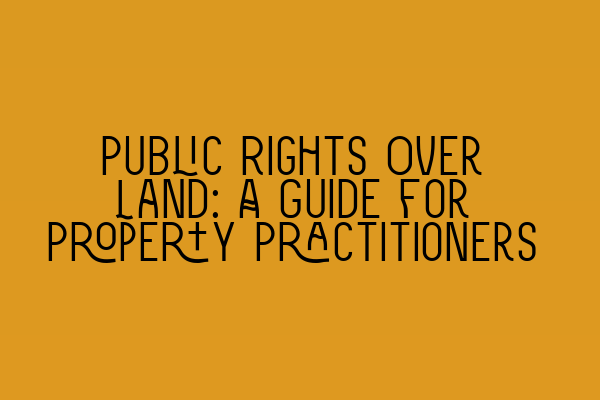Public Rights Over Land: A Guide for Property Practitioners
As property practitioners, it is vital to have a comprehensive understanding of public rights over land. These rights can have a significant impact on property transactions, development projects, and disputes. In this article, we will explore the various types of public rights over land and provide insights to help you navigate these complexities.
1. Public Rights of Way
Public rights of way are one of the most common types of public rights over land. They are legal rights that allow the public to access and pass through certain areas of land. These rights are usually established through long usage or by an explicit dedication by the landowner. Public rights of way can be footpaths, bridleways, or byways open to all traffic (BOATs).
To ensure that you are aware of any public rights of way affecting a property, it is essential to conduct a thorough search of the local authority’s definitive map and statement. This search will identify the exact location, status, and restrictions associated with each public right of way. By having this information, you can advise your clients accordingly and avoid any potential disputes in the future.
2. Public Rights to Drain Water
Public rights to drain water refer to the legal rights of local authorities or statutory bodies to drain water from private land. These rights are typically necessary to prevent flooding or pollution in a particular area. Examples of public rights to drain water include the construction of drains, culverts, or sewers on private land.
When dealing with these rights, it is crucial to review the property’s drainage plans and assess any potential impact on the property’s value or development potential. Additionally, you should ensure that the necessary statutory agreements or easements are in place to protect your client’s rights and interests.
3. Common Land and Village Greens
Common land and village greens are another important category of public rights over land. Common land refers to land that is subject to rights of common, such as the grazing of livestock or the collection of firewood by local inhabitants. Village greens, on the other hand, are areas of land where local communities have the right to engage in lawful sports and pastimes.
These types of public rights can have a significant impact on property transactions and development projects. Before proceeding with any transaction or development on common land or village greens, it is crucial to establish the exact extent of these rights. This can be achieved by conducting searches and reviewing the local authority’s register of common land and town or village greens.
4. Public Rights of Navigation
Public rights of navigation are legal rights that allow the public to navigate certain waterways. These rights can include the use of rivers, canals, and other water bodies for boating, fishing, or other recreational purposes. Public rights of navigation are usually established through long usage or by an explicit dedication.
When advising clients who own or are considering purchasing properties with waterway access, it is essential to understand the specific rights and restrictions associated with public rights of navigation. This knowledge will enable you to guide your clients effectively and ensure compliance with any necessary regulations or licensing requirements.
In conclusion, public rights over land are a crucial aspect of property law that property practitioners must navigate proficiently. By understanding the different types of public rights and conducting thorough due diligence, you can provide accurate advice, mitigate risks, and safeguard your clients’ interests.
For further practice, consider taking the SQE 1 Practice Exam Questions or SQE 1 Practice Mocks FLK1 FLK2 to enhance your knowledge and skills. Additionally, if you are preparing for the SQE exams, explore the SQE 2 Preparation Courses and SQE 1 Preparation Courses available to help you succeed. Stay up to date with the latest SRA SQE Exam Dates to plan your studies effectively.
Remember, a comprehensive understanding of public rights over land is essential for property practitioners. By staying informed and continuously improving your expertise, you can deliver exceptional service to your clients and achieve success in your legal career.
Sources:
– SQE 1 Practice Exam Questions
– SQE 1 Practice Mocks FLK1 FLK2
– SQE 2 Preparation Courses
– SQE 1 Preparation Courses
– SRA SQE Exam Dates
